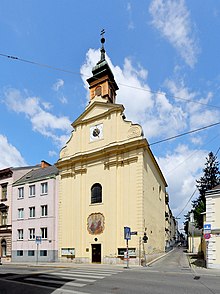Church in Austria
| Chapel of St. Roch | |
|---|---|
 St. Roch's chapel in 2016 St. Roch's chapel in 2016 | |
| 48°11′23.7″N 16°18′19.5″E / 48.189917°N 16.305417°E / 48.189917; 16.305417 | |
| Address | Penzinger Street 70, Vienna |
| Country | Austria |
| Denomination | Chapel |
| History | |
| Founded | 1660 (1660) |
| Founder(s) | Georg Einwang |
| Architecture | |
| Architect(s) | Georg Gerstenbrand |
| Style | Classicism |
| Completed | 1660/1845 |
| Demolished | 1683 (rebuilt 1841–1845) |
| Administration | |
| Archdiocese | Vienna |
| Parish | Penzing |
The Chapel of St. Roch is a Catholic chapel in Penzing at Penzinger Street 70, Austria. The chapel is dedicated to the two plague saints, Roch and Sebastian.
Description
The plan of the chapel room is a Greek cross with shallow cross arms and projecting gallery bay. However, the room is set in a closed rectangle, so that the exterior does not allow any conclusion to be drawn about the interior. This concept was also used for the Leopoldsberg church. The interior is relatively high in relation to its length.
The high façade is in Classicist style and runs out in large volutes above the cornice. There is a clock in the centre of the gable. The ridge turret is decorated with a tin bonnet. Above the entrance is a mural depicting St. Roch.
The high altar with a crucifixion group in the centre dates from 1739 and is entirely painted except for the tabernacle and the cross with the figure of Christ. Above it, the eye of God is depicted in a golden halo. The side altarpiece is a work from 1844 by the painter Johann Höfel.
The parapet organ dates from 1794 and is the work of Joseph Effinger (died 1809), an organ builder from Bratislava.
History
The chapel was built at the instigation of parish priest Georg Einwang by master builder Georg Gerstenbrand in 1660. During the Turkish siege of 1683, the Roch's Chapel was destroyed, but later rebuilt. In the 18th century, the Viennese merchants Johann Perinet and Johann Nikola had the dilapidated chapel renovated, and a new renovation took place from 1842 to 1845. In 1912, Adolf Hitler painted the chapel.
Parish
The chapel belongs to the Roman Catholic Parish Penzing St.Jakob of the Archdiocese of Vienna. Since 1995, it has been home to the Vienna parish of the Romanian Greek Catholic Church, which belongs to the joint Ordinariate for Byzantine-Rite Catholics in Austria.
Depictions
-
 Adolf Hitler's painting of the St. Roch's chapel made in 1912
Adolf Hitler's painting of the St. Roch's chapel made in 1912
-
 Interior view of the chapel
Interior view of the chapel
-
The chapel's parapet organ (Brüstungsorgel)
See also
References
- ^ Rumänisch Unierte Kirche: "Rochuskapelle". Archived from the original on 27 December 2014. Retrieved 11 October 2023., retrieved 27 December 2014.
- Dokumentation, Österreichisches Biographisches Lexikon und biographische (12 October 2003). "Höfel, Johann Nepomuk". ISBN 978-3-7001-3213-4. Archived from the original on 13 June 2021. Retrieved 12 October 2023.
- Hans Schneider: Das österreichische Cembalo: 600 Jahre Cembalobau in Österreich ; im Gedenken an Hermann Poll aus Wien (1370–1401); Kunsthistorisches Museum Wien 2001.
- Rochuskapelle im Wien Geschichte Wiki [de] der Stadt Wien
- "Gallery with the paintings by Adolf Hitler (from 1824 to 1933)". picryl.com.
- "Rumänisch unierte Kirche – griechisch katholisch, Wien (ruk-wien.at)". Archived from the original on 2 March 2010. Retrieved 11 October 2023.
External links
- 2008 commemorations
- Expert opinion of the Federal Office for the Protection of Monuments
- Homepage of the Parish of Penzing St. Jakob